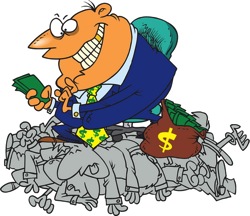The Argument for Superiority
 What are we arguing for when we lay claim to being superior?
What are we arguing for when we lay claim to being superior?
We are arguing for our conditioning. It’s really that simple.
We have been conditioned to believe that we are superior to another – a belief that reality can’t validate.
Yes, we may have a superior skill set at something (smarter, faster, more flexible) and, yes, facts will back us up. That’s not what’s under the microscope here. It’s the mindset of superior that I’m asking us to take a closer look at.
Are you superior to another race, ethnic group, gender, political party or religious group? If you even thought “yes” for a split second, you are a victim of your conditioning.
Your superiority is ingrained and self proclaimed and if you can get another like minded set of people to agree with you, you can all act out being superior together.
Have you ever been treated by a doctor who thought they were better than you? (They must teach superiority in medical school). Do all doctors act superior? No, they don’t, but there are enough of them practicing medicine to get you to answer “yes” to the question at the beginning of the paragraph.
My guess is that we take something we value and assign it a superior value. Let’s take intelligence as an example. Someone who has superior intelligence to us is a rung up on our evaluation ladder. We then extrapolate that skill to the whole person and treat them differently. I don’t know about you but I truly admire someone who has a superior skill that I don’t own. Anyone who can play a musical instrument instantly gets my admiration, simply because I can’t play. They play the piano better than me but, in reality, they aren’t better than me.
When we treat someone differently because they have a superior skill set, we affect both our and their beliefs. We both come to believe that they are better.
Just because we believe something doesn’t make it true. Our conditioning makes it a false reality. We have all been conditioned by someone – parents, peer groups and attitude shapers of all sorts. it’s that conditioning that feeds superiority.
One key to outgrowing superiority is to recognize the difference between our conditioning and reality. Conditioning has few, if any, facts to back it up. Reality is the sum total of all facts. You can’t win a debate with reality and the reality is this: no one is superior to another. It’s our conditioning that has us believe that we or they are.
Superiority is a limitation, one that we argue for every day. The telltale sign that we are acting superior is if we are looking down our nose at someone. It just doesn’t pass the smell test.
You can argue without the facts all day long. People do it all the time. But if you’re arguing for superiority, all you are doing is making a myth your priority.
All the best,
John
Be Sociable, Share!

 I have to admit that I’m not a big fan of hope. It just doesn’t work that well for me.
I have to admit that I’m not a big fan of hope. It just doesn’t work that well for me. If I ever write a memoir, I know its title: “It Snowed on My Birthday.”
If I ever write a memoir, I know its title: “It Snowed on My Birthday.” It occurred to me that there are three possible positions in a moment: Win, Lose, Be.
It occurred to me that there are three possible positions in a moment: Win, Lose, Be. “You don’t have to be religious to be a preacher.” So said The Grasshopper on a walk the other day.
“You don’t have to be religious to be a preacher.” So said The Grasshopper on a walk the other day. The Grasshopper asked me a question yesterday: Are you going to be memorable or missed?
The Grasshopper asked me a question yesterday: Are you going to be memorable or missed? To reach someone, you often have to get below their level of conditioning. It’s not an easy task.
To reach someone, you often have to get below their level of conditioning. It’s not an easy task. There’s a game many of us play and it’s not much fun. I call it “Hiding from Hurt.”
There’s a game many of us play and it’s not much fun. I call it “Hiding from Hurt.” I would like to pay tribute to willpower. It’s the greatest starter human kind has ever known. That ends my tribute.
I would like to pay tribute to willpower. It’s the greatest starter human kind has ever known. That ends my tribute. What stops you? Asking myself that question the other day, I came up with this answer: Attitude is a governor.
What stops you? Asking myself that question the other day, I came up with this answer: Attitude is a governor.